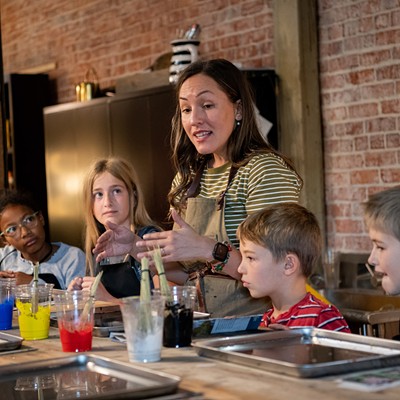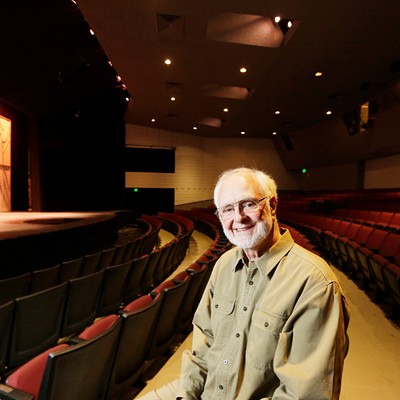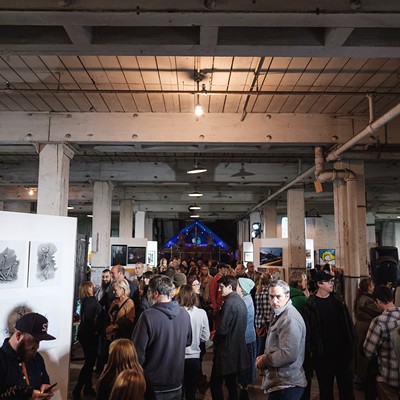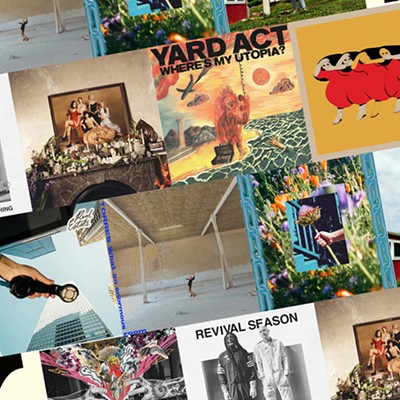
Classical music is a genre predicated on legacy. No other performance art form primarily leans on works created centuries ago. But within the symphonic realm, it's also important to be mindful of living legacies. The Spokane Symphony is acutely aware of this.
Before the COVID pandemic put a wrench in live music, the organization planned to bring together all of its living former conductors/music directors to each take up the baton and conduct a concert in its Masterworks series. That includes the current Brit in charge, James Lowe (2019-present); his German predecessor, Eckart Preu (2004-2019); and Brazilian maestro Fabio Mechetti (1993-2004).
That vision becomes a reality during the symphony's 2022-23 season. Lowe will conduct the bulk of the Masterworks, Mechetti will lead the symphony through a program of Brazilian and German compositions (Gomes, Strauss, Wagner) in October, and Preu will take the stage for a German/Austrian combo of Wagner and Bruckner next March.
In anticipation of the Masterworks performances, The Inlander organized a Zoom roundtable discussion with all three composers.
INLANDER: What's the first thing that springs to mind when you think of the Spokane Symphony?
LOWE: I think the word I would use is family. That's the feeling we have when we're on stage.
PREU: I had a similar feeling. The word that came to my mind first was warmth. It's something that I felt at my audition concert — people were very open to ideas and were really trying to do whatever you asked them to. During my tenure, I found no matter their repertoire, no matter the venue, no matter what I tried — weird or not — they were always willing to try new things. And that was actually the entire organization, not just the musicians. Nobody would block anything. It has been a very adventurous organization.
MECHETTI: That's exactly the same feeling I had — what now... almost 30 years ago? What impressed me most about Spokane Symphony was this willingness to really make music and not being afraid to tackle the hardest repertoire. A very honest way of making music.
LOWE: I'd just love to kind of chime in on that one, too. In my selection week, when I had my concert, I'd been working in Finland. And I'd had an idea there, and I said it to the boss there, and she said, "Ah, we don't do it that way." And then I remember coming to my audition week and talking to Jeff vom Saal, the executive director, and I mentioned the same idea. And he said, "Ah! We don't do it that way... that's really interesting! Try that!" And that was the moment I thought, "Oh yeah, this is a good gig."
Do you have any favorite pieces or performances during your tenure?
MECHETTI: Spokane Symphony was my first orchestra, so everything was exciting. Sometimes it was the first time they were playing it — things like Rite of Spring or whatever. I remember a program I did that was the Scythian Suite, Rite of Spring and a Tchaikovsky — The Sleeping Beauty or Swan Lake. It was all Russian, from the Romantics to Prokofiev. When we thought about doing that concert, there was some suspicion about it. Are you crazy? Are you really going to do it? And it was one of the best concerts I think we've done there.
Another thing that I think was very important at that time was the recording. We did Beethoven's Ninth Symphony. It was the first recording the city had done at the time.
PREU: It was also my first orchestra, and I have 15 or so years to draw memories from. I'm like a malfunctioning computer where a lot of memories just come back randomly. I remember our Carmina Burana... Mahler's Third.
I loved when we branched out and did the adventurous concerts. When we went to the Big Easy [the current Knitting Factory]. I have great memories of our Concerts in the Parks. The opening of the Fox was of course a big deal; that was phenomenal.
LOWE: I started in September 2019, right before the lockdown. There were a bunch of concerts we did pre-lockdown — a very enjoyable performance with the chorus of the first and second suites of Daphnis et Chloé."Running a symphony orchestra is really like walking a tightrope blindfolded whilst juggling knives."
tweet this
But I think about some of the work we did in lockdown, when we came and we filmed a lot of digital concerts. Although the audience wasn't there — the magic ingredient wasn't there — it was this real feeling of carving new ground. Nobody had done this anywhere before. We'd never had to do concerts without an audience. Figuring that out and putting all that together, that was a huge project. I really, really enjoyed that. Also, frankly, the relief of being able to make music again after a year of total silence, that was a very kind of magic moment. I remember the first rehearsal we did, the first note sounding for that project. It was very emotional.
What are some of the bright spots and challenges you faced as the music director at Spokane Symphony?
MECHETTI: I'm sure it's not much different than what it is today. The positive is the high quality of the orchestra for the size of the budget we have and the size of the community we have. And the difficulty is exactly the budget itself.
But it's always been a case that Spokane has always been an example of an orchestra that, even within a smaller city, can think big. It's a model that many orchestras actually envy.
The plan to buy the Fox came at the end of my tenure there. It was a great idea, but it put somewhat of a dampener on what we could do with the orchestra itself, because we could not raise money for both things. But at the same time, it was a time when we expanded the repertoire, we did our first recording, I introduced the opera in concert.
PREU: In terms of highs and lows, I think the absolute low was the strike and how that was handled. When personnel issues and organizational issues come to basically a grinding halt for quite a while, everybody suffers. And so coming back out of that that was really, really tough.
There are plenty of highs, though. First, all this stuff that we did for the first time: the concerts at the Big Easy, Symphony with a Splash, the concerts at Arbor Crest. We did a series of contemporary concerts where the orchestra and the audience would sit on stage. All these adventurous things. I was really, really proud of the organization's willingness to try new things.
The other high was the opening of the Fox. That was a game-changer for the symphony. Playing at the Opera House just limited the artistic potential of this group. Being at the Fox meant double performances of the classics. So we have two shots at the same program. That makes a big difference. The second performance on Sunday afternoon is always different, and usually better than the first one. And just the acoustics of the Fox were very conducive to really working on music excellence. Really exploring all the wide palette the orchestra has for a sound.
LOWE: Adding on to that, it's actually quite rare that a symphony gets to rehearse and perform in the same hall. That is a luxury. It becomes part of the personality of the orchestra. When they know that they can rely on how they listen in the hall or how they hear, they have a much better feeling of how they're going to sound out in the hall. And then you end up with this very rare thing where the hall and the orchestra start to develop a kind of symbiotic relationship.
The Concertgebouw Orchestra in Amsterdam is kind of the ultimate example of that. It’s a concert hall that some other orchestras don’t sound great in, but that orchestra really knows the nuances. And I think having that for us is a huge, huge benefit.
Running a symphony orchestra is really like walking a tightrope blindfolded whilst juggling knives. It is an extraordinarily complicated, difficult job. You can never quite predict what's going to come around the corner. A little bit unusual for orchestras in America, our model is inverted. Most symphonies' [finances] are like 60/40 donated/earned. We're 60/40 earned/donated. So that meant that when the pandemic hit, it hit us financially harder than some other organizations.
Symphony orchestras are evolving. I think there's a model from the 1950s, which was your town has a symphony orchestra, and you're really damn lucky to come and hear us and pay your money. And now I think that has to be inverted — we're a community organization who happens to do that through giving concerts. You can see different orchestras are embracing that, and some orchestras are resisting that. And the ones that embrace that are really doing fantastically well, and they become an integral part of the community.
If you guest conduct somewhere, [it’s always telling] when you get into the cab at the airport and you say, “I’m going to symphony hall” or something and the driver says, “Where’s that? We’ve got a symphony hall?” That doesn’t happen here. People know about this orchestra; they know about the Fox. We’re so deeply embedded in the community. That for me, is really the biggest strength we have.
Do conductors typically interact with one another? If so, what do you learn from each other?
MECHETTI: The reality is the last time I talked to Eckhart was… I don’t know when! And James the same!
PREU: 20 years ago!
[Everyone laughs]
MECHETTI: The interaction between conductors in general is very rare. As the music director, if there is an opportunity to discuss some things — what happened when you were here with this particular situation — I think we’re always trying to be helpful. But in my experience, we rarely interact with the former or the future music directors as much as probably we should. But I think that’s the nature. Once you take over an orchestra you want to start working, you’re busy, and you’re trying to implement your own stamp on that.
PREU: I agree with everything that has been said. Conductors are lone fighters. What Fabio said is totally true; usually former and future music directors don’t interact with each other. Fabio moved across the country as far away as possible to Florida, and then to Brazil! I mean, there was really no interaction possible. But I lived in town when James started. So what I consciously tried to do is to stay out of his way. There’s Mozart in the Jungle, where the music director always hovers around. I did not want to be that person. He needs space. It’s his shift. But James was very, very gracious, inviting us and interacting and keeping contact, which is not natural. There’s no real reason for two conductors to be in the same town unless there are two orchestras. It’s very rare to be colleagues.
LOWE: It is a very lonely profession in that sense. Although I have to say, Eckhart was extraordinarily gracious and very helpful when I started here. I remember we had a very long coffee where I had a very long list of things I needed to talk to him about, and it was extraordinarily helpful. But once you’ve kind of left the student zone, you don’t tend to see a lot of other conductors.
For a while, some friends of mine, we had this kind of online discussion group we called the Conductor’s Arms. It was kind of like an online pub, a little secret society. Basically, we’d write and say, “Oh, my God, I’m guest conducting in X. Was the first horn as much of a pain in the neck for you as it is for me?” And they’d write back and say, “Yeah, yeah. He’s famous, you know.” So that was really nice having that kind of very practical support. But normally we’re like ships that pass in the night.
What are you looking forward to about your turns conducting during this upcoming season?
MECHETTI: Well, first of all, getting reacquainted with old friends. Spokane was such an important place in our lives. I still have very strong, close friends to this day, even though we are miles and miles apart.
My program is mostly German, with a little hint of Brazilian. Strauss is one of my favorite composers. The orchestra always enjoys playing it because even though it’s very difficult, it’s musically extremely rewarding. And the same thing with Wagner. This piece that I’m doing to open the concert is by a 19th-century Brazilian composer who sounded like Verdi.
PREU: So with the orchestra, I’ve done Bruckner’s Symphony No. 4, 6, 7, and now 3. I’ve always found that the orchestra plays Buckner really well.
But what I find, particularly in comparison with other orchestras I conduct, that after 15 years with the musicians, we know each other really, really well. And they know my physicality really well. So where, where I have to work with other orchestras — even orchestras that I’ve conducted for three or four years — people are still straight with trying to figure me. But I’ve done hundreds of concerts with these musicians. So every little movement I make is understood and interpreted. They know exactly what I want. And so I think this familiarity, this almost intimacy, the intimate understanding, between gesture and music and translating it to sound is something that is only achieved after many, many years of working together. And I think that is what I’m looking forward to.
And, of course, as Fabio said, seeing old friends and colleagues again. And I love working with Mateusz Wolski in particular, my favorite content master.
LOWE: I do love the idea that all three living music directors of the Spokane Symphony are appearing in the same season. And I think that that’s a really nice thing. Obviously, we were supposed to do this for the 75th anniversary, but, you know, COVID had other plans. Now we can finally do it in one season. That’s a very special thing for the orchestra. ♦
For the full Spokane Symphony Masterworks 2022-23 schedule and tickets, visit spokanesymphony.org.































